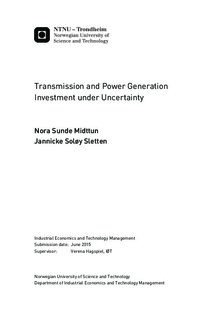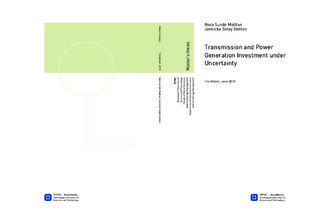| dc.description.abstract | Regulated transmission system operators, (TSOs), need to anticipate generation capacity additions and accommodate future growth when building transmission lines. Given the last decades' deregulation of the European power sectors, EU policymakers are facing the challenge of achieving goals to mitigate climate change since they have relinquished control of the power sector. This challenge has contributed to an increased need for understanding how market participants will respond to TSOs' investment decisions, and how TSOs can accommodate generation expansion and increase adoption of renewable energy technologies among power companies.
We study a market consisting of a welfare-maximising TSO and a profit-maximising power company. The TSO holds an option to invest in a new transmission line, while the power company has installed some generation capacity but holds an option to expand. The proposed model captures both the investment strategies of the TSO and the power company and accounts for the conflicting objectives and game-theoretic interactions of the distinct agents. Taking a real options approach allows us to study the effect of uncertainty on the investment strategies and take into account timing as well as sizing flexibility.
We provide insight to TSOs by studying 1) how much welfare a TSO will forgo by disregarding a power company's optimal investment decision, 2) the effect of uncertainty on optimal transmission and generation investment strategies, and 3) the value of managerial flexibility.
We find that disregarding the power company's optimal investment decision can have a large negative impact on social welfare for a TSO. This is because, in most cases, the TSO will want both agents to invest in a larger capacity than what is optimal for the power company. This implies that the TSO faces a risk of investing in transmission capacity that will be left unused by the power company if it does not consider the power company's optimal capacity decision. The only time we find that the optimal capacity of the TSO is less than that of the power company is if the TSO does not have timing flexibility and is forced to invest at a low demand level. Then, for low uncertainties, the optimal capacity of the TSO is dominating. Furthermore, we find that if the TSO considers only the power company's sizing flexibility and not the flexibility in timing, then it risks investing in a too small capacity. This is because the power company would optimally want to delay investment, and, therefore, invest in a larger capacity than the TSO anticipates it to install if it assumes that the power company invests at the same time as itself. We furthermore conclude that not only does a subsidy of the power company's investment cost increase the optimal capacity, but it also triggers earlier investment by the power company. Therefore, a subsidy can be used as a tool to increase social welfare.
We find that increased demand uncertainty leads to an increase in optimal capacity and a delay in investment because of the increased value of waiting. Also the welfare loss from not taking the power company's optimal investment decision into account increases in uncertainty.
This paper extends the theoretical real options literature by considering a two-firm setting with different objectives tackling both timing and capacity choice of the agents. It provides insight into how the conflicting objectives affect the optimal investment strategy of the TSO. Therefore, it is a step in the direction of providing better policies to increase power companies' adoption of renewable energy technologies. | |

